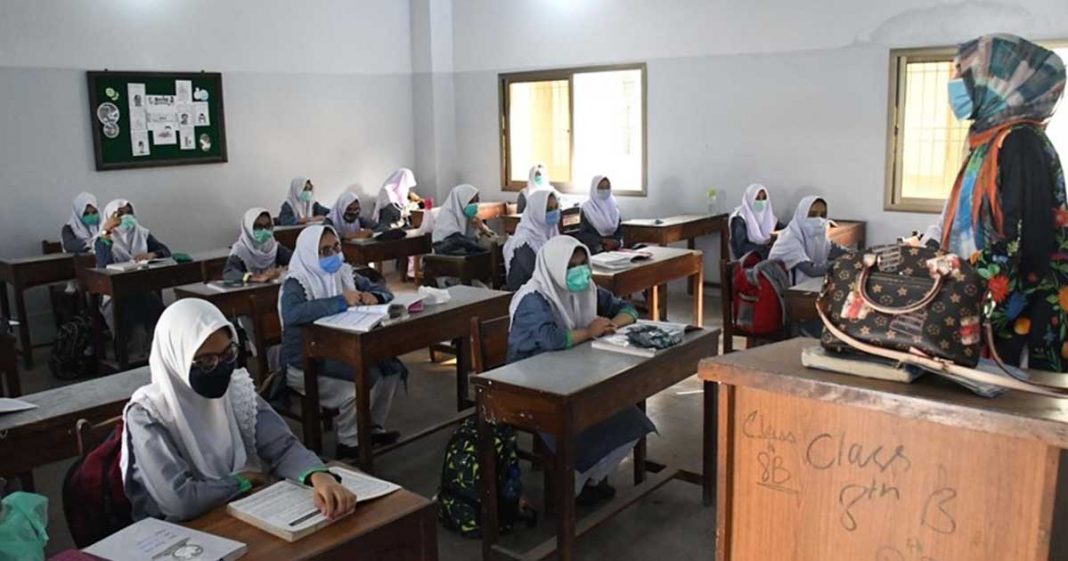Federal Minister for Education Shafqat Mahmood announced on Friday that classes one to eight will resume from Feb 1 instead of Feb 25.
After a detailed analysis of the situation by health and education ministers we have decided to start classes for 9,10,11,12 as per announced schedule of Jan 18. Priority is being given to them because of board exams that have been postponed to May, June 1/2
— Shafqat Mahmood (@Shafqat_Mahmood) January 15, 2021
Speaking at a press conference after chairing a meeting to review the Covid-19 situation ahead of phase-wise reopening of educational institutions from next week, he said classes nine to 12 and universities will resume on Jan 18 (Monday) and Feb 1, respectively, as per the previous decision.
The minister said the country didn’t witness a significant drop in infections from November 26, stressing the need to create a balance between the health and education sector.
He pointed out that closing academic institutions had the biggest impact on the country’s national tally of coronavirus cases. Students suffered great educational loss last year but their health is the government’s foremost priority at the same time, he added.
نویں، دسویں ، گیارہویں اور بارہویں جماعتوں کےلئے تمام تعلیمی ادارے اٹھارہ جنوری سے کھولنے کا فیصلہ ۔ پہلی سے آٹھویں کے لئے سکول یکم فروری سے کھولے جائیں گے اور ملک بھر میں یونیورسٹیوں بھی یکم فروری کو کھلیں گی
وفاقی وزیر تعلیم @Shafqat_Mahmood کی #NCOC اجلاس کے بعد میڈیا بریفنگ pic.twitter.com/bPdX8NU5p3— Ministry of Education and Professional Training (@EduMinistryPK) January 15, 2021
Earlier on Jan 4, a meeting of education ministers had decided to reopen educational institutions across the country in a phase-wise manner with classes nine to 12 resuming in the first phase on January 18.
Read more: In Pakistan public education suffocates under surging population
Mr Mahmood had said that primary classes will resume from January 25 in the second phase whereas universities and other higher education institutions will resume on-campus sessions from Feb 1.
Should Pakistan reopen schools?
Analysts in Pakistan are suggesting the government to reopen educational institutions in order to ensure that private schools, colleges and universities do not go bankrupt. A country already struggling to deal with an unprecedented economic recession may not be in a position to give any bailout package to schools dealing with economic repercussions as a result of the deadly pandemic.
Savail M Hussain, a prominent economist and entrepreneur, recently argued that “it is the time to reopen education”. He also maintained that “in a country where even in the best of times almost 22 million children remain out of school, continued school closure will result in an educational and social disaster that will take generations to repair. Governments are risk averse – and rightly so”. Mr. Hussain also said that “they [governments] must not ignore the evidence that education is amongst the lowest-risk sectors. They must take heart from what the world is doing and what people across Pakistan are telling them. And above all they must demonstrate leadership for that will determine – in this once in a lifetime crisis – whether Pakistan sinks deeper into the abyss of ignorance and its attendant miseries, or emerges stronger”.
Mr. Hussain also noted: “Of the almost 50 million children in school, two out of every five attend private school. This makes Pakistan one of the few countries in the world where the private sector accounts for such a large proportion of the education system. Over 85 percent of the almost 200,000 private schools that dot the length and breadth of the country are low cost institutions (fees of Rs2000 per month or less), and most function from rented premises. Therein lies the rub: prolonged closures such as the one we are experiencing mean fee incomes for most low cost schools dry up, while recurring costs such as teacher salaries and rent continue to pile up.”
The facts as presented above make a case for reopening educational institutions with strict implementation of SOPs as outlined by WHO and the government of Pakistan.














